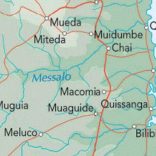Violence in northern Mozambique forces thousands to flee, straining aid efforts - UN News
INAE: Still no evidence Ceres apple juice is harmful to health; 700 boxes removed in Mozambique – Carta

Picture: Carta
Four days after announcing the prohibition of the sale and consumption of 200 ml Ceres apple juice boxes as unfit for human consumption, Mozambique’s National Inspectorate of Economic Activities (INAE) on Tuesday still had no evidence that the product is harmful to health.
Speaking at a press conference yesterday morning, the institution’s spokesman, Tomas Timba, said that it was still premature to reach such conclusions, as “deep laboratory analyses” are underway to assess the extent to which the product can cause disease.
“What we learned from the factory itself is that this is a preventive withdrawal, not because there is evidence that the levels of Patulin in these units will cause diseases as such, perhaps if there is excessive consumption,” he explained.
Last Friday (November 12), INAE called the press to inform that it was withdrawing from the national market all 200ml packages of Ceres apple juice because it detected mycotoxin- Patulin, a substance capable of causing vomiting, nausea, gastrointestinal problems and, in more severe cases, death.
Timba has not said how long the laboratory tests will take, but the INAE is known to have been notified of the case in October, when the South African company Pioneer Foods first discovered the problem.
Of the more than 2,000 boxes on the market, INAE says that it has removed only about 700 boxes in Nampula and Maputo provinces and in the city of Beira, in Sofala. In other words, more than 1,000 boxes of juice batches produced on the 14th, 21st and 22nd of June are either still to be removed or have already been consumed.
READ: LiquiFruit recalls some apple juice products amid concerns over mycotoxin
Woolworths recalls some apple juice cartons due to mould toxin
Ceres maker recalls apple juice from seven African countries – BBC
This is not the first case of withdrawal of South African food products considered harmful to human health. In February 2020, the Ministry of Health ordered the removal of canned goods of the Pilchards brand on the grounds that they were “deteriorated”. In March 2018, authorities banned the consumption of processed meats and other sausages produced by two South African companies after a Listeriosis outbreak in that country.
In both cases, the final outcome of investigations was never made known, and the products went back to being marketed normally.
By Marta Affonso












Leave a Reply
Be the First to Comment!
You must be logged in to post a comment.
You must be logged in to post a comment.